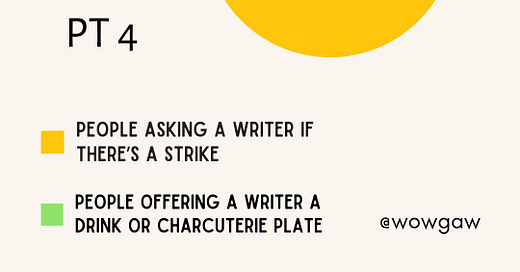First things first. I’m in union leadership as a WGA Captain and Co-Chair of the Women’s Committee. This substack post is not me speaking for the WGA but me speaking as myself and my opinion on the next month or so.
The big elephant in the room in Hollywood these days seems to be a strike. If I had a coin for every time someone has asked me about a POSSIBLE STRIKE, I think I’d be able to afford a house at this point. Kidding aside, writer wages are so depressed, getting any type of a house is nearly impossible.
And in all seriousness, please offer a writer a drink or charcuterie plate.
As we all know, since March 20th, AMPTP (The Alliance of Motion Picture and Television Producers) and the WGA started negotiations. On April 3rd, a a Strike Authorization Vote (SAV) was called and members will be voting from April 11th-17th. An SAV gives our union the ability to declare a strike if negotiati…
Keep reading with a 7-day free trial
Subscribe to Writing & Wellness to keep reading this post and get 7 days of free access to the full post archives.




